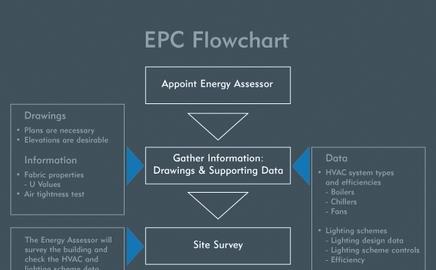Confused about preparing for the EPC onslaught? A leading building services engineer offers a guide to getting ready for the new legislation
With the April Energy Performance Certificate (EPC) deadline coming ever closer, we asked Glenn Massey, the executive engineer at Hoare Lea Engineering Management to take us through the process as simply as possible. He made a flowchart for us (attached) and here takes us through the key points to bear in mind as you navigate the choppy waters.
Massey encourages building owners to start the process now. “The essence of this process is that building owners and property managers can appoint a Building Services Consultant to carry out an assessment of the drawings and Heating Ventilation and Air Conditioning (HVAC) scheme data. Start ahead of the Energy Performance in Building Directive (EPBD) implementation dates. If sufficient data is available work can commence entering the building into the chosen National Calculation Methodology (NCM)."
1 Give a thought to appointing someone at the first opportunity. As I said, like any part of this process, it’s best to do it as soon as you can.
2. Get hold of the boiler and air conditioning manuals and the like. You might have to spend a wee bit of time hunting these down. The key thing is that if the property owners and manufacturers spring into action it gives them a good opportunity to find a way forward. If you can’t find a boiler manual to hand, there are other avenues such as the manufacturer. The Carbon trust also has a list of equipment as part of the Enhanced Capital Allowance scheme.
3. It’s up to the assessor to choose the appropriate calculation method. There’s a choice. There are three grades of assessor qualified to use different tools. That’s IES, Tas and other approved DSM software for Grade Five and approved Standard Building Engineering Model (SBEM)-based tools for Grades Three and Four.
4. The next step is sending this to the accrediting body. As to who is accrediting the accreditors, that’s a different matter. There is a danger of a second rate, ‘black market,’ developing.
5. Overall the EPC scheme is a first step and a very positive one in enabling building owners, occupiers and managers to understand how their building stacks up, efficiency-wise. If you don’t have this benchmark, there’s no possibility for improvement. Engineers can now get to work and show huge improvements.”





























2 Readers' comments